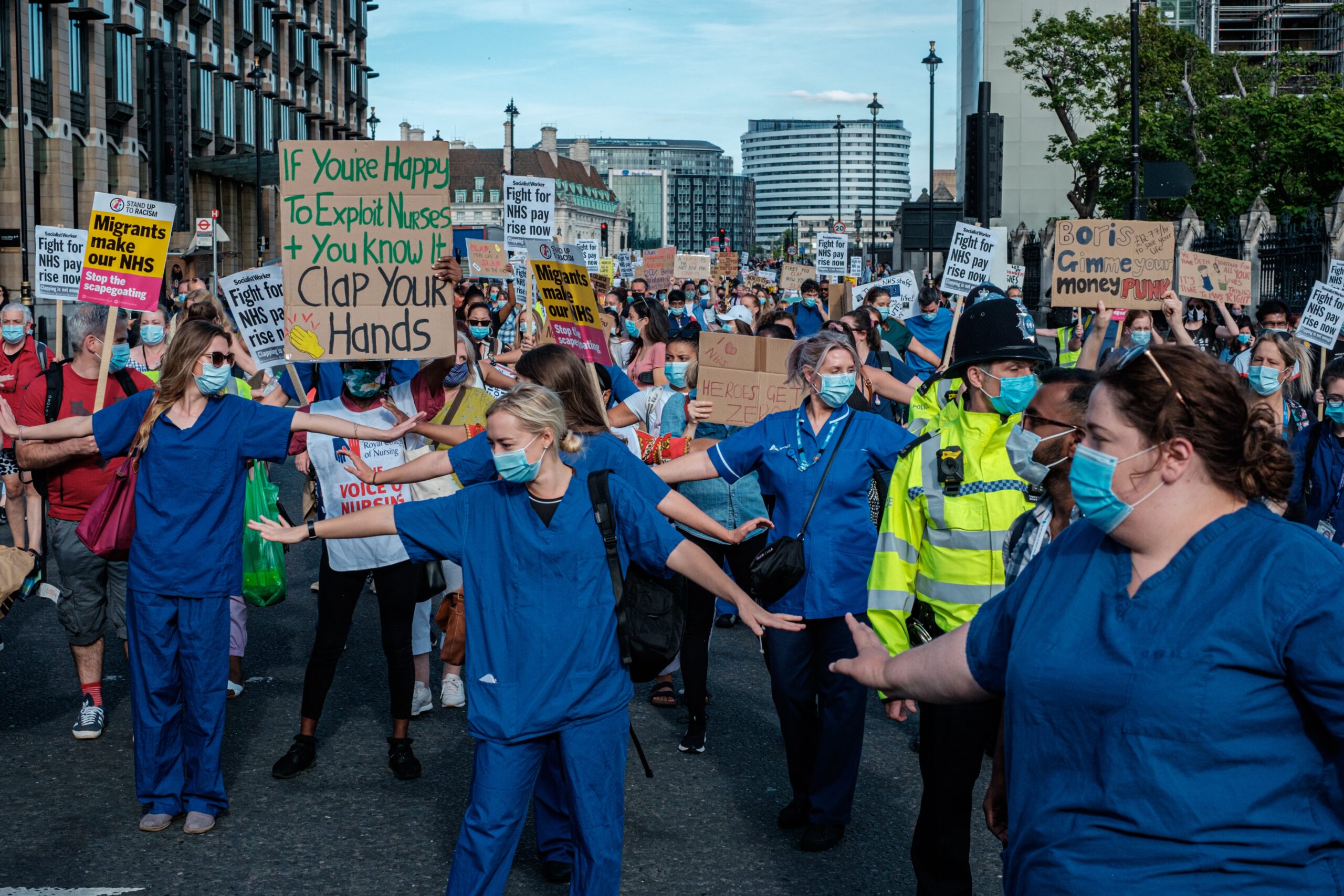The National Health Services (NHS), often hailed as a cornerstone of the UK’s welfare state, has faced numerous challenges over the history of the United Kingdom. The most pressing challenge currently is the ongoing strikes campaigned by the healthcare workforce. Since July 2022, NHS strikes in the UK have been sparking debates on healthcare funding, staff shortages, and workers’ rights.
Here we will be examining the causes and consequences of the recent NHS strikes in conjunction with statements from Panoramic Care’s Managing Director David Geaney and Lead Consultant Bronte Sharp emphasising the need for a balanced approach that prioritises both quality healthcare and the rights of healthcare workers to build a stable future for patients and nurses.
We are now entering the eleventh month of industrial action across the NHS. The first round of strikes in December 2022 affected just 44 of 209 hospitals, mental health trusts, and community services campaigning for a fair raise in pay. However, on July 12th 2023, the NHS faced the longest-ever strike action by junior doctors (five consecutive days) which was followed by the first walkout by consultants and radiographers in more than a decade. Causing industrial disruptions across over 1 million NHS hospital appointments. The causes of these strikes’ epicentre from the effects of staff shortages, poor pay and conditions, and ongoing pandemic pressures. Real wages for healthcare staff have stagnated or even decreased over the years due to austerity measures and NHS workers have long complained about their pay and working conditions. The increased demand for healthcare services, better compensation, mental health support, and retention issues have left healthcare workers feeling overworked and underappreciated.
Although measures have been taken to mitigate disruptions caused by these strikes, there have still been seismic interferences. Patients have suffered due to postponed appointments, and the overall quality of care has seen a decline during strike actions. Research findings regarding the impact of clinical strikes on inpatient care have yielded diverse conclusions. A study published in 2010 by the National Bureau of Economic Research raised concerns about the safety of patients during clinical strikes, reporting a 19.4% rise in inpatient mortality and a 6.5% increase in hospital readmissions during strike periods.
However, this is contrary to a more recent study in 2022 by Essex et al. This research found that clinical strikes do not appear to significantly alter the rates of inpatient mortality. Instead, the most critical determinant of patient mortality during strike actions appears to be the continuity of emergency care services. When emergency care is sustained, the influence of strike action on inpatient mortality rates tends to be negligible. Consequently, it implies that the forthcoming nursing strikes may not substantially affect mortality rates and patient care in hospitals where strikes are planned, as measures are taken to safeguard the provision of emergency care services during the strikes.
Despite the effects of strikes on patient health and surrounding sectors it is critical to remember the motives behind these strikes. David Geaney took to his LinkedIn page to ask his audience whether it is morally acceptable for nurses to strike if it affects patient care. Below are his findings.
“From this morning at 7 am, there is a 72-hour NHS strike by both consultants and junior doctors, the eighth NHS strike since July. In the middle of a healthcare crisis marked by high inflation and staff shortages, doctors in the UK are going on strike to demand better pay, arguing that their salaries have not kept pace with the rising cost of living.
The strike, although intended to address financial concerns, has raised a lot of questions in the media about its potential impact on patient care.”
Out of the four voting groups, (Yes, fair pay matters most, No, it will harm patients, They already get paid enough, and Undecided) the majority (58%) voted that fair pay matters most despite any negative effects on patient care, 24% voted no on the grounds that the patients will be affected negatively, 4% of people believe that NHS workers are already paid enough and the remaining 13% stand undecided.
Bronte Sharp comments on David’s findings ‘I think you raise a crucial ethical dilemma that is clearly ongoing in the UK here, David. Of course, I think doctors have a duty of care over their patients to deliver the best quality care and, thus, by striking, hang this duty in the balance. However, advocating for better pay and working conditions, in the long run, will improve patient care and ensure the healthcare system resumes a sustainable framework for all those involved long into the future as intended.’
To address the root causes of the strikes, the government must put indifference aside commit to investing in the NHS and should engage in long-term planning to address the underlying issues causing an imbalanced and dissatisfied workforce. This could include prioritising strategic workforce planning, training and development programs, and innovative solutions to healthcare delivery. Adequate funding can help alleviate staff shortages, improve working conditions, and provide fair compensation to healthcare workers.
The recent NHS strikes in the UK reflect a complex fusion of factors. Balancing the need for quality healthcare and workers’ rights is a challenging task that requires a multifaceted approach. Adequate funding, open dialogue, and a focus on staff wellbeing are essential components of a sustainable solution. Ultimately, the aim should be to ensure that the NHS can continue to provide high-quality healthcare for our nation while also valuing and supporting its dedicated workforce.
Please get in touch if you have any hiring queries.
Contact our
Specialist Hiring Teams
Panoramic Associates have dedicated hiring experts who specialise in their chosen market. Use the adjacent form to contact our team about your career ambitions or hiring requirement.
